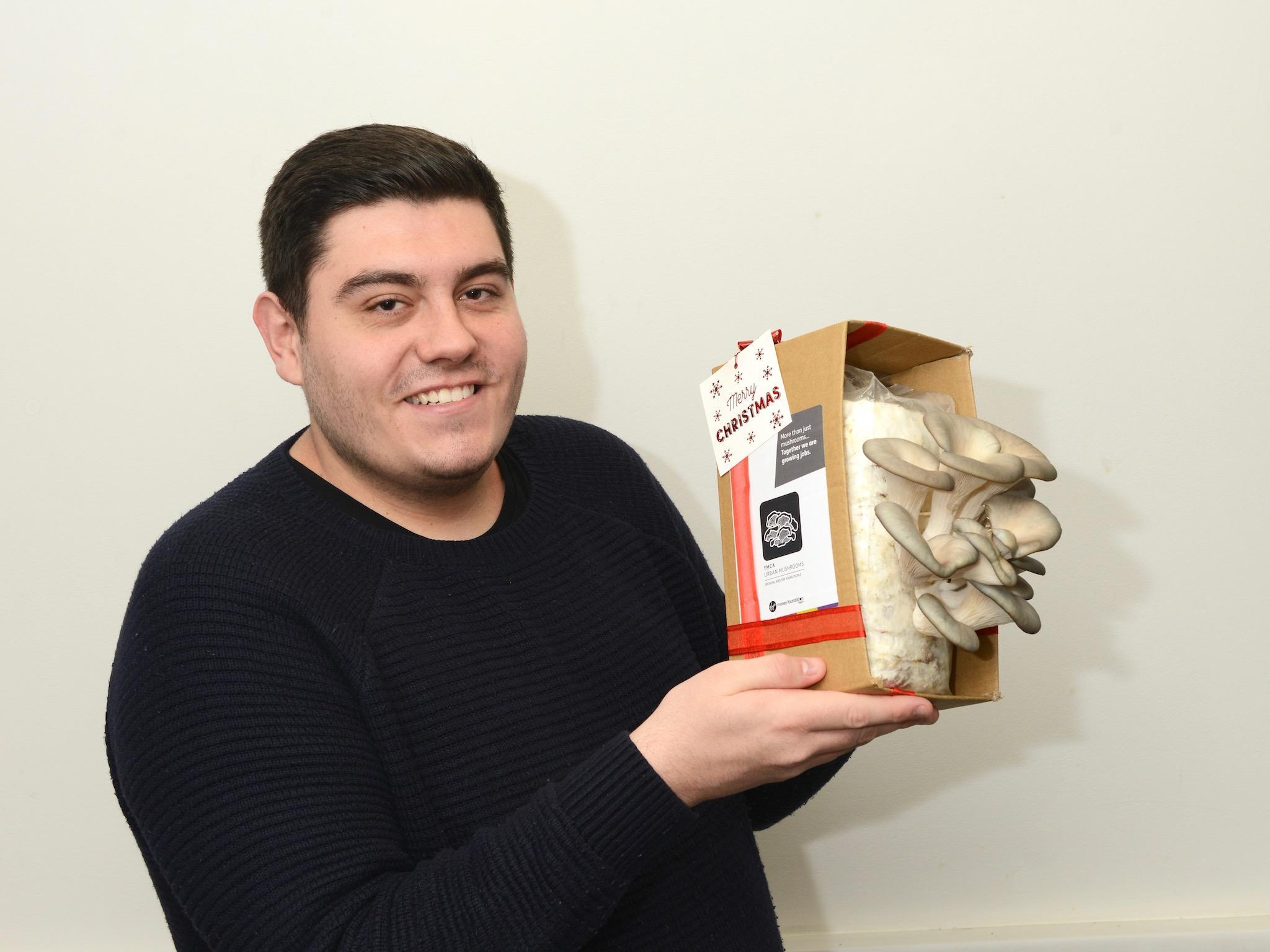Urban Mushrooms: the social enterprise tackling youth unemployment by growing mushrooms from coffee waste
Urban Mushrooms was set up by Jeff Hurst, the chief executive of YMCA Newcastle, after he learned about growing mushrooms in coffee grounds

Leslie never thought he’d be growing mushrooms for a living. The 24-year-old has been working at Urban Mushrooms, a social enterprise in Newcastle, for eight months, sometimes walking the eight-mile round trip to the office in the city centre that has been turned into a temporary farm. Growing mushrooms has provided Leslie with a precious steady income after a lifetime in care and on benefits.
“I didn’t think I’d ever do something like this,” Leslie says. “If someone said what would you like to do as a job, I’d never think I’d be growing mushrooms. I like it because I knew a lot of the people here and I’ve known them for most of my life. They understand me.”
Urban Mushrooms was set up by Jeff Hurst, the chief executive of YMCA Newcastle, after he learned about growing mushrooms in coffee grounds at The Skill Mill, an annual event that helps young offenders gain meaningful employment. Hurst was attracted to the idea of providing jobs for young people in a niche industry, where competition was limited.
But he also needed to fill a gap in funding at the YMCA, which lost 50 per cent of its finance in 2016 due to cuts to government-funded programmes for young people excluded from school and college.
“If we don’t own our own income, we won’t be able to run our charity,” says Hurst of the YMCA. “The imperative is there: innovate or close. I wanted to create a social enterprise that enables us to meet our charitable objectives and create a sustainable income.”
Urban Mushrooms, which started in 2016, was supported by a seed capital grant from Virgin Money, which funded 75 per cent of the first year of running costs. Hurst secured some small capital grants to pay for equipment, bringing the total running costs funding from grants to 90 per cent, with the other 10 per cent funded by the YMCA.
The business has developed partnerships with local coffee shops to collect coffee grounds that would normally go to landfill. Instead, the waste is pasteurised and used to grow oyster mushrooms that are sold to local restaurants, including the nearby Tyneside Cinema, which has reworked its menu to include vegan dishes like its oyster mushroom katsu curry.
“We’re always interested in sourcing quality local produce for our Bar Café and Vicolo menus,” says chef Steve Brough. “These mushrooms are both really tasty and local, giving us an ideal way to reduce food miles and also be greener by reducing our waste.”
Urban Mushrooms has already stopped six tonnes of coffee grounds from going to landfill. The UK sends 500,000 tonnes of grounds go to landfill every year, wasting the product’s natural bio-oils that can be used in industries, from cosmetics manufacturing to biodiesel production. While fresh coffee grounds are toxic to many plants, its acidity and dampness is an ideal breeding ground for funghi.
Urban Mushrooms uses a process of cold pasteurisation to sterilise the grounds. “We’re trying to create a low-tech, low-skilled, low-cost business because of the people we want to employ,” he says. “It has to be easy and it has to be cheap.”
The North East has some of the highest numbers of youth unemployment in the country, while only around 50 per cent of young people leave school with five GCSEs at grade A-C. This contrasts with the local student population, according to Hurst, which numbers 50,000.
“Our young people find it hard to get a job,” he says. “They are outperformed by the students at the local universities. There’s only so much demand for mushroom farmers, but we’re giving young people skills on their CV to go out and get work, for example turning up on time, but also what it means to be part of a business and work as a team.”
Urban Mushrooms currently employs two staff and several apprentices, including Calvin, who has been working at YMCA Newcastle as a digital marketing apprentice for 18 months. He has recently been offered a full time position in the same role.
“I was working part time jobs and in a café. I wanted to do the apprenticeship to get into a career instead of doing jobs I wasn’t enjoying,” he says. “The apprenticeship approach has been good for doing hands-on work and learning in a practical sense.”
Calvin has been using Photoshop and Google Analytics in his work promoting Urban Mushrooms products, from four varieties of mushrooms, to the GrowBox that enables people to grow their own mushrooms at home.
The next step, according to Jeff Hurst, is scaling the business through a growers’ collective. “We can’t meet the demand for our fresh product, and neither can we grow at the scale we need to because that would mean investing in a large farm. Instead we’re looking at scaling up through a franchise method, so that other people will become growers in a collective, whether that is through another charity, a YMCA or individuals.”
For now, Hurst is happy to have helped even one or two young people in Newcastle on the path to stable employment. “Seeing Leslie overcome his challenges and grow into a responsible individual, learning the value of being self-reliant, that makes me proud,” Hurst says. “He is flourishing.”
Subscribe to Independent Premium to bookmark this article
Want to bookmark your favourite articles and stories to read or reference later? Start your Independent Premium subscription today.

Join our commenting forum
Join thought-provoking conversations, follow other Independent readers and see their replies